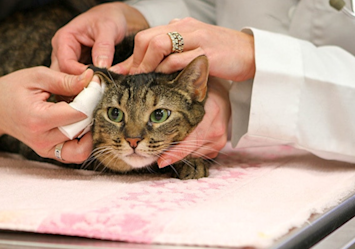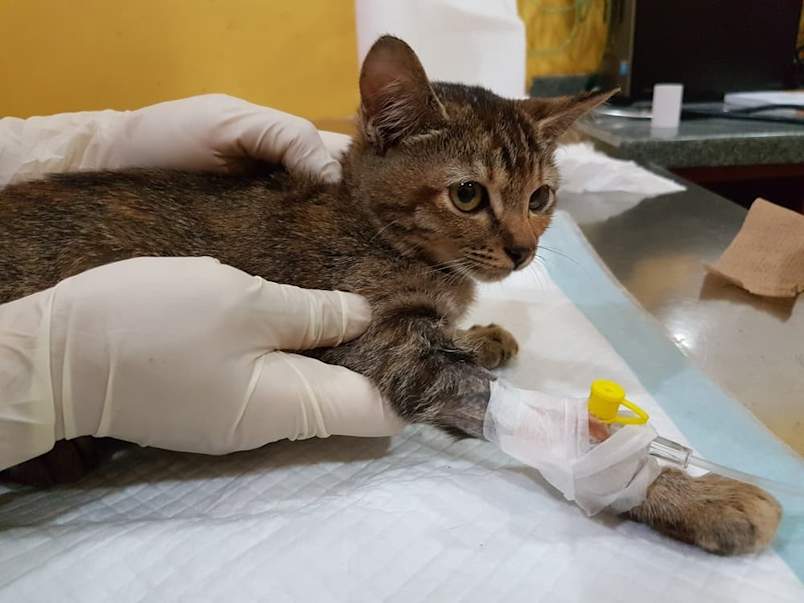
If your cat gets diagnosed with cancer, your mind likely focuses on two things: how do I care for my cat and how much is it going to cost? That’s a lot of “c”s to worry about, so let’s take one of them off the list and look into detail at how much cat cancer treatment costs. Just know you’re not the only cat owner wondering this as nearly six million cats get diagnosed with cancer every year, and expenses can be significant, so understanding what you could end up paying is important.
Common Types of Cat Cancer and Treatment Options
You may be surprised to learn that many of the most common types of cancer that can occur in cats are ones that can also occur in humans. If you’re at all familiar with human cancer treatments, then you may be able to guess what kinds of treatments your veterinarian will recommend should your cat get diagnosed with cancer. Some of the most common cat cancers are:
Lymphoma: The lymph system runs throughout the body and is in charge of draining excess fluid and white blood cell production. Cancer cells can accumulate and reproduce here with the most common site in cats being the intestinal tract. This is one that I have diagnosed a lot of and usually presents with a kitty losing weight and not feeling right with a palpable lump in the abdomen.
Squamous Cell Carcinoma: Frequently occurring in the mouth, this cancer can cause bad breath, drooling, and difficulty chewing. It can also show up on the ears, nose, and face due to sun exposure.
Mammary Cancer: Here’s one that can be reduced by having your cat spayed before their first heat. Otherwise, mammary cancer shows up as lumps around the nipples on the belly and it can metastasize, or spread, quickly.
Fibrosarcoma: A type of soft tissue cancer, this one is usually slow to grow but can cause a lot of damage to its neighboring tissues.
Melanoma: Another type of cancer often associated with sun exposure is melanoma. These can show up as black lumps on the lighter-haired parts of the skin, mainly the ears and face.
Osteosarcoma: This is cancer of the bone that can be very painful and is quick to spread.
Treatment Options for Cat Cancer
Even though this list may look long, these are just a few types of cancer that cats can get, but no matter the type, the treatment options are roughly the same--remove it if you can and cover your bases with chemo or radiation.
Surgery: With any luck your cat’s cancer diagnosis will be an operable type, meaning surgery can remove it. These types of cancers are treated by removing the tumor and a large portion surrounding it in order to get all of the cancer cells. Tumors best treated this way include fibrosarcoma, osteosarcoma, mammary tumors, and potentially melanoma and squamous cell carcinoma.
Chemotherapy: This treatment involves giving your cat medications that kill rapidly dividing cells, a category which cancer cells fall into. This treatment can be used for tumors that can’t be surgically removed and as a follow up to surgery to make sure the body is free of cancer cells. These medications don’t specifically target cancer cells only, so side effects can be severe.
Radiation: This approach uses radiation to kill cancer cells in a targeted area. It may be an option for tumors that are inoperable. Again, it doesn’t just kill cancer cells, so side effects may be a concern.
Immunotherapy: A relatively new player in the cancer treatment game is immunotherapy. Here a kitty is given medications that help guide their immune system to hone in on the cancer cells, boosting their own ability to fight it. Unfortunately, this one is fairly complex and not available for all types of cancer.
Costs of Cat Cancer Treatment
Here’s where we get to the numbers, and just to warn you, they may be a little scary.
Average costs for surgical removal typically start around $300-$500 and go upwards from there. Factors that may affect this price include where the tumor is located, how big it is, and where you have the surgery done. If your general vet is able to do it, great! Costs will likely be lower than if a specialist has to get involved.
Average chemotherapy for cats costs $100-$300+ per dose with many cats needing 3-6 months of treatment. You may be looking at $1,000-$5,000 or more for the full treatment. The type of cancer is going to affect how long the course of chemotherapy is and therefore affect the cost. Keep in mind that the dog chemotherapy costs will likely be on the higher end due to their size.
Radiation requires several weeks of treatment and can be done in conjunction with chemotherapy. Either way, cat radiation therapy cost can be around $2,000-$7,000. Variations can again be due to the cancer type, size, location, etc.
Immunotherapy might be your most expensive option, and it isn’t available for every cancer or even in every area, so talk to your vet about this one to see if it’s a possibility.
Keep in mind that your location is also going to affect the cost. Some veterinary clinics will be able to do some types of cancer treatment in-house, which may be less expensive, while others will refer you to a specialist, which will likely be more expensive.

Financial Assistance and Pet Insurance for Cat Cancer Costs
We realize those numbers above are high, but there are options to help you out. One of those options is cat health insurance. Pet health insurance covers more than just accidents, it can also have your back on illnesses. So, does pet insurance cover cancer treatment? Yes! (most of the time) In order for pet health insurance to cover the costs of cat cancer treatments, you need to have your kitty enrolled before they are diagnosed. This goes for other illnesses and accidents, so, get your cat a policy as soon as you bring them home.
Other options that may help you out financially are funding from non-profits. This often comes in the way of Good Samaritan Funds or other accounts set up to help pets in need. These are often largely funded through donations, so if you have a penny or two to spare, consider donating to one of these local funds. Talk to your vet or shelters and rescues about options in your area that may be able to help.
Cat Cancer Post-Treatment Care
Let’s get away from the money side for a minute and talk about another very important aspect of a cat’s cancer diagnosis—how to care for them. Before undergoing any cat cancer treatment, you should have a long, long talk with your veterinarian about the side effects of the treatment and the quality of your cat’s life. I’m going to be a real downer here but most cancer treatments don’t make a cat feel really great and the little bit of survival time that you get from them may not be worth it.
Now, that being said, if you and your vet decide that treatment is the answer for your cat’s cancer, your work doesn’t end there. Instead, you’ll be asked to monitor your cat for side effects associated with cancer treatments which may include vomiting, not eating, and infections. Report any side effects to your vet. Be prepared for lots of potential re-check visits to address side effects, which may increase your cat cancer treatment cost.
You can try to encourage your cat to eat by offering canned food or some lean, cooked meat, or your veterinarian may recommend a diet change. Give them a safe, comfortable spot to rest and recuperate and shower them with love and affection. It may be best to separate them from other animals in the household so that they don’t have to compete for resources.
Alternative and Complementary Cat Cancer Treatments
You may find mention of alternative therapies for cats with cancer during your research, but be wary and don’t give your cat anything without recommendation from your vet. That being said, there are some complimentary treatments that may be beneficial, which acupuncture and certain supplements being some of them. Ask your vet about anything else that may help with your cat’s treatment.
The Cost of Cancer Treatment for Cats is Just the Beginning
As we know from human medicine, cancer is best treated when caught early, and it’s no different for cats. Regular veterinary care is an important step to ensuring that any issues get caught early and that your cat gets the best treatment possible. While those treatments are expensive, having a pet health insurance policy in place before the diagnosis can help you breathe easier and focus on your cat’s recovery.